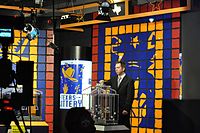
Photo from wikipedia
Motivated by traffic congestion and air pollution, Beijing is one of several major cities to restrict vehicle ownership by requiring residents to win a lottery for the right to obtain… Click to show full abstract
Motivated by traffic congestion and air pollution, Beijing is one of several major cities to restrict vehicle ownership by requiring residents to win a lottery for the right to obtain an additional car. We examine the welfare cost of preventing people from owning cars because of misallocation: under a lottery, some individuals with low willingness to pay (WTP) for cars can obtain cars, while other individuals with high WTP cannot. We estimate welfare costs using a new contingent valuation method survey of Beijing lottery participants which we designed and conducted explicitly for this purpose. We find that restricting vehicle ownership reduced private welfare by 26 billion yuan. Back-of-the-envelope calculations suggest that the benefits of lower congestion and pollution roughly equal the costs. Our WTP estimates indicate a net welfare gain of approximately 32 billion yuan if Beijing’s lottery were replaced with an auction, which is similar to previous estimates.
Journal Title: Journal of Benefit-Cost Analysis
Year Published: 2023
Link to full text (if available)
Share on Social Media: Sign Up to like & get
recommendations!